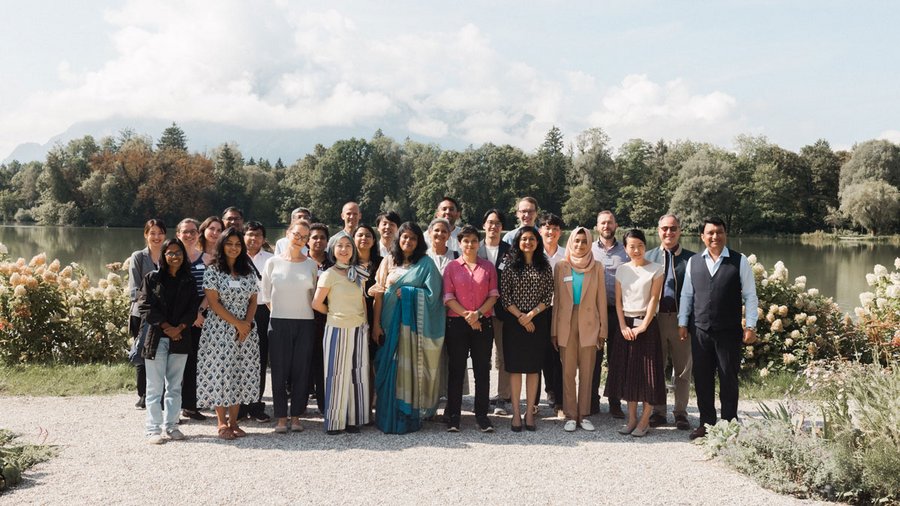Fellows representing Japan and India work together to advance innovative cross-cultural team projects
At the end of August, Salzburg Global Fellows participating in the Japan-India Transformative Technology Network met at Schloss Leopoldskron, after working together online for nearly two and a half years. While having never met each other in real life, the first day of the session was filled with joyful reunions, like old friends meeting again.
The result of a partnership between Salzburg Global Seminar and the Nippon Foundation, the Network connects and empowers outstanding change-makers in two countries at the forefront of technological progress in Asia – India and Japan.
It offers a platform for those working towards social good to maximize the benefits of various forms of new technologies. Together, Fellows develop innovative ideas to apply technology to products, processes, policymaking, organizational practices, and financing across three related sets of challenges: health systems; accessibility, mobility and inclusion; and living and livable communities.
“I personally really value the program because it gave us the opportunity to meet across extremely different cultural contexts, but also across vastly different professional contexts,” said Naomi Clara Hanakata, assistant professor for urban planning at the National University of Singapore, a participant of the Japan-India Transformative Technology Network.
During their week together in Salzburg, Fellows had the opportunity to further their own existing work, including the collaborative projects they have been developing, as well as to discuss the issues, build their skills, and consider new projects for the future.
“In 2019, you all applied for this program. We promised you one thing, and then COVID-19 happened and forced us to shift everything online-only indefinitely. We recognize just how difficult it was, having to trust each other without having met, but we really hope that this interaction online and project development and ideas have given you additional hope during those difficult times,” said Charles Ehrlich, Salzburg Global program director, to the Fellows.
The projects being developed as part of the Japan-India Transformative Technology Network are:
- ENABLING MAGOME: AN EMPATHIC DESIGN STRATEGY FOR COMMUNITY REVITALIZATION
- NEXT SENSORY AUGMENTED HEARING AID (NSAHA) PROJECT
- PROJECT SAFAR (SAFE AND ACCESSIBLE FARE USING AI ON ROADS)
- SUNO SUNAO: MOBILE SERVICE & INFORMATION PLATFORM FOR WOMEN
“For Suno Sunao, it was a once-in-a-lifetime experience of showcasing our work from the last few months - covering not just our milestones, but also the challenges that the team experienced. We received valuable critical feedback that we will be discussing further as a team. Additionally, we immediately received specific strategic inputs and potential collaborations that we hope will take this project quite far,” said Aishwarya Panicker, health team senior associate at RTI International India, and member of the Suno Sunao team.
The week consisted of varied activities; from project feedback sessions, skills-building exercises, and discussions about the different approaches to technology in Japan and India, or how to influence public policy; to working groups, informal networking, and even piano concerts in a hall where other great talents like Mozart once performed as a child.
One of the week’s highlights did not involve the discussions, yet perfectly represented the cultural richness of the program. During tea breaks, Indian and Japanese Fellows brought tea and treats from the two countries, sharing the way they would usually drink tea, a beverage important in both countries but enjoyed differently, to enhance cross-cultural connectivity and exchange.
“I would’ve never imagined to be a part of a group that’s so diverse, so talented. It’s a privilege to be among all these people,” reflected Mohit Challa, an AI and technology expert, and program participant.
The magic of Salzburg Global Seminar is being able to meet someone you never thought you could connect with, let alone relate to so deeply. It’s about people coming from all walks of life, learning from each other, and leaving Schloss Leopoldskron feeling inspired to change the world in their own community, starting this trickle-down effect of impact. It only took Fellows four days of reflection and being outside of their comfort zone to realize how much potential their ideas can have.
“Arriving at the Schloss Leopoldskron to meet the Salzburg Global and Nippon Foundation teams and other [Network] Fellows was beyond what I had imagined. We had been waiting for this moment for the last two years, more so to meet each other in person. I’m sure others will agree that the amount of expertise, lived experiences, and intelligence that was in the conference room brought a lot of excitement- honestly, four days was not enough- and we definitely will cherish (and hopefully continue) the enlightening conversations that occurred.
“Thank you to Salzburg [Global Seminar] for bringing us all together and building on collective wisdom. We hope to keep engaging in whatever capacity possible and seeing the success of all projects presented,” reflected Aishwarya on her experience.
In his closing remarks, Charles Ehrlich discussed the next steps: “During the last few days, we solidified some projects and designed steps to move forward. We are all friends in this room. What happens next is you go home, and we actually do this work. We will be announcing the recruitment of a new cohort, but that does not mean you’re done. It just means you have more friends. The value of the network is the value you put into it. Be generous, but be greedy. Ask people for help and make use of the Network to create a better world.”
To be part of the Japan-India Transformative Technology Network, apply here.


